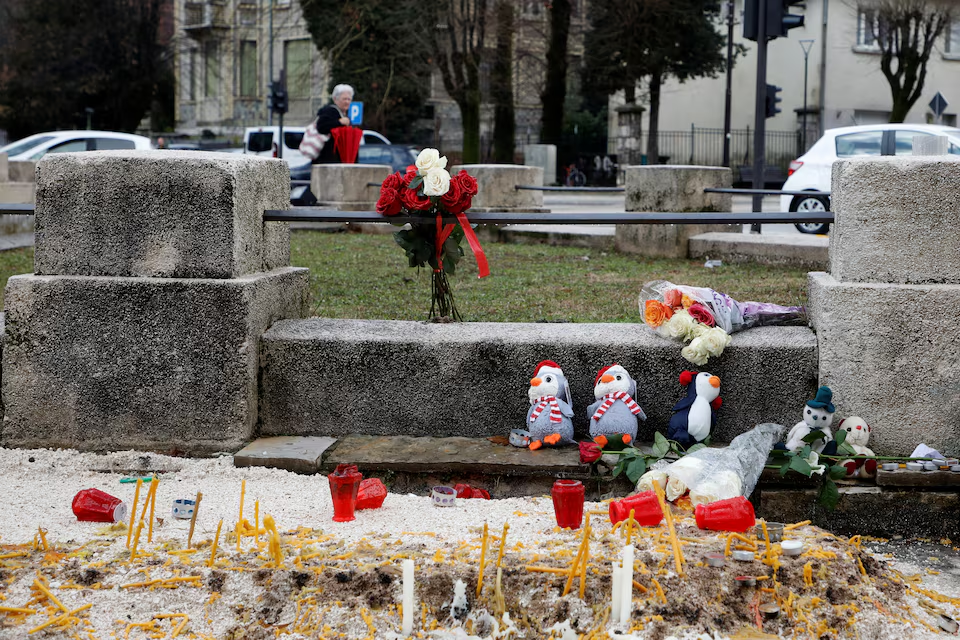In a heart-wrenching reminder of the deep-seated issues surrounding gun violence in the Balkans, a series of mass shootings have reignited the urgent debate on illegal firearms in the region. Montenegro, a country once hailed for its picturesque landscapes, has been struck with yet another tragedy—one that devastates not only families but also the spirit of a nation struggling to control its weapons culture. This time, the carnage was triggered by a tavern brawl, leading to the death of 13 individuals in the old capital of Cetinje, all from the hands of a man wielding an illegal firearm.
Vesna Pejovic, a 63-year-old woman whose daughter and grandsons were killed in a 2022 mass shooting, has been at the forefront of lobbying for stricter gun control in Montenegro. The latest attack shattered the fragile hope she had for reform. “We had to relive all our horrors all over again,” she said. Despite years of advocating for more robust legislation, including the proposed Marko’s and Masan’s Law named after her late grandchildren, the implementation of change remains elusive.
Prime Minister Milojko Spajic has promised to tighten gun control measures following the shooting, including more stringent background checks for gun license applicants and a two-month amnesty period for those possessing illegal firearms. However, the region’s deeply ingrained gun culture, compounded by decades of armed conflict, has made it extremely difficult for governments to enforce such laws.
The Balkans, particularly countries like Montenegro, Serbia, and Bosnia and Herzegovina, are littered with millions of firearms left over from the brutal wars of the 1990s, and the ongoing struggle to regulate them continues to plague the region. Even when gun amnesty programs are implemented—such as the one launched in Montenegro, where tens of thousands of weapons were surrendered—experts are skeptical about their long-term effectiveness. “It’s not enough to have good legislation; you must also have the resources and will to enforce it,” says Nils Duquet, Director of the Flemish Peace Institute. His remarks highlight the core issue: the trafficking of illegal weapons is fueled by powerful criminal organizations that undermine any efforts to curb gun violence.
While Montenegro’s amnesty program has seen some success, surrendering over 1,500 illegal weapons in just three weeks following the latest mass shooting, experts estimate that up to 100,000 illegal firearms are still in circulation. The problem is further compounded by a staggering 70% increase in gun-related incidents across the region between 2019 and 2024. Unfortunately, despite widespread public outcry, gun-related deaths have remained relatively consistent, with the Balkans’ death rates from gun violence being more than 30% higher than those of major EU countries.
The region’s criminal underworld is keenly aware of the global demand for weapons produced in the Balkans. They are cheaper, and the black market for them extends far beyond the region. Firearms from this area were involved in several high-profile terrorist attacks in Europe between 2015 and 2016, and their presence in criminal contexts continues to be a significant concern.
Nevertheless, there is a glimmer of hope. In late 2023, the Western Balkans agreed to harmonize their gun laws with the European Union’s standards, marking a critical step toward combating illicit firearm trade. Efforts such as Bosnia’s strengthened customs checks have successfully intercepted firearms bound for countries as distant as Japan and the United States.
Despite these measures, the real challenge remains in tackling the widespread culture of gun ownership deeply rooted in the region. Montenegro, which ranks third globally in gun ownership per capita, faces significant resistance to any form of gun control. In a country where guns have been an integral part of daily life for centuries, even the idea of disarming is met with skepticism.
“The weapon is a part of our culture. It’s not just a tool, but a symbol of our history and identity,” explains Velimir Rakocevic, a criminology professor in Podgorica. This cultural attachment to firearms is evident throughout the region, where antique guns are displayed in homes, restaurants, and even public spaces.
It’s clear that to effectively combat illegal firearms in the Balkans, a two-pronged approach is needed: legislation that is not only well-designed but also effectively enforced, and a significant shift in the regional mindset towards guns as a symbol of power. Without these changes, gun violence will likely continue to haunt the region.
Stay ahead with the latest news on global innovation, leadership, entrepreneurship, business, and tech. Join us on WhatsApp or Telegram for real-time updates. Have a report or article? Send it to report@theinnovationtimes.com. Follow us on X (Twitter), Instagram, LinkedIn, YouTube, Pinterest, and Facebook for more insights and trends.



